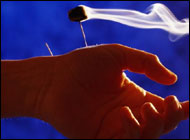Acupuncture doesn’t reduce arthritis pain
New research suggests that the reduction in arthritis pain as a result of exercise-based physical therapy is not enhanced by the addition of acupuncture.
Various groups have advocated the use of acupuncture alongside conventional arthritis therapy, but data supporting its benefits are limited, and the topic remains controversial, lead author Dr. Nadine E. Foster, from Keele University in Stafford, UK, and colleagues note in the Online First issue of the British Medical Journal.
In their study, the researchers assessed the level of pain relief in 352 men and women with knee osteoarthritis who were at least 50 years old. The patients were randomly assigned to undergo standard physical therapy alone, or in combination with acupuncture or a sham procedure that only resembled acupuncture.
Pain was assessed using the Western Ontario and McMaster Universities osteoarthritis index. Six-month follow-up data was available for 94 percent of the patients.
At the beginning of the study, the patients’ average pain score was 9.2. After 6 months of treatment, all three patient groups experienced similar reductions in pain scores, in the range 2.28 to 2.53, the researchers report. 
Compared with the physical therapy-only group, the other two groups showed slight improvements in pain intensity and unpleasantness. However, these benefits were short-lived, and the researchers deemed them unlikely to be clinically relevant. Since these slight improvements were also seen in the sham acupuncture group, the benefit was probably unrelated to acupuncture.
“Our trial failed to show that acupuncture is a useful adjunct to a course of individualized, exercise-based physiotherapy for adults with knee osteoarthritis,” the investigators conclude.
“This adds to the existing body of evidence as acupuncture was compared with an effective comparison treatment,” they state.
Foster’s group recommends additional research “to investigate the possible mechanisms of acupuncture, particularly the role of expectancy effects.”
SOURCE: British Medical Journal, August 15, 2007, Online First.